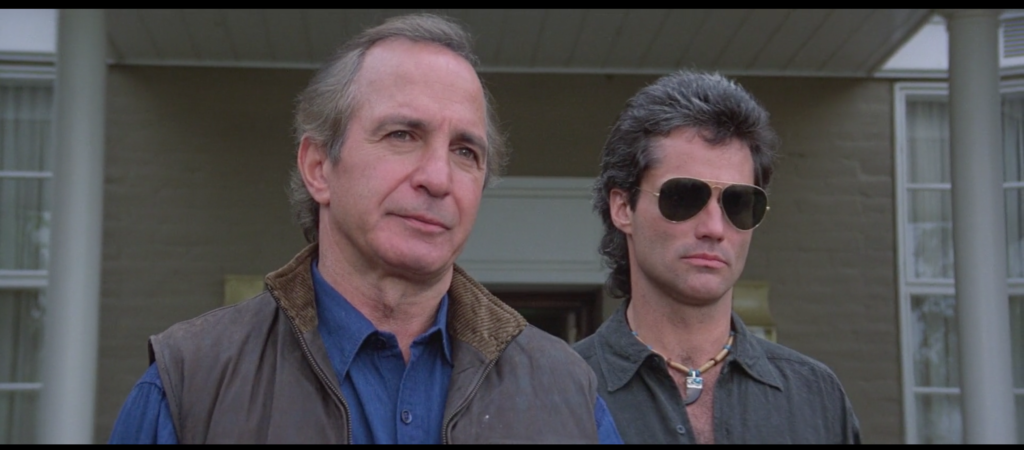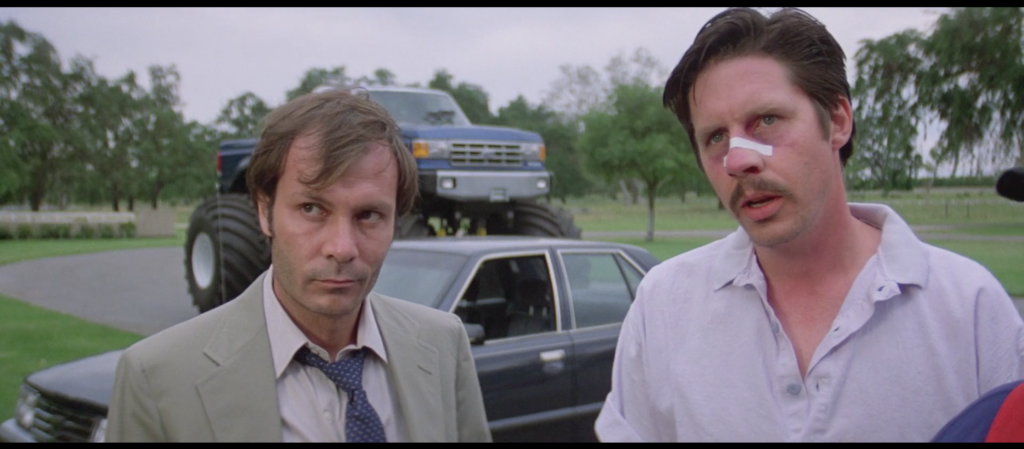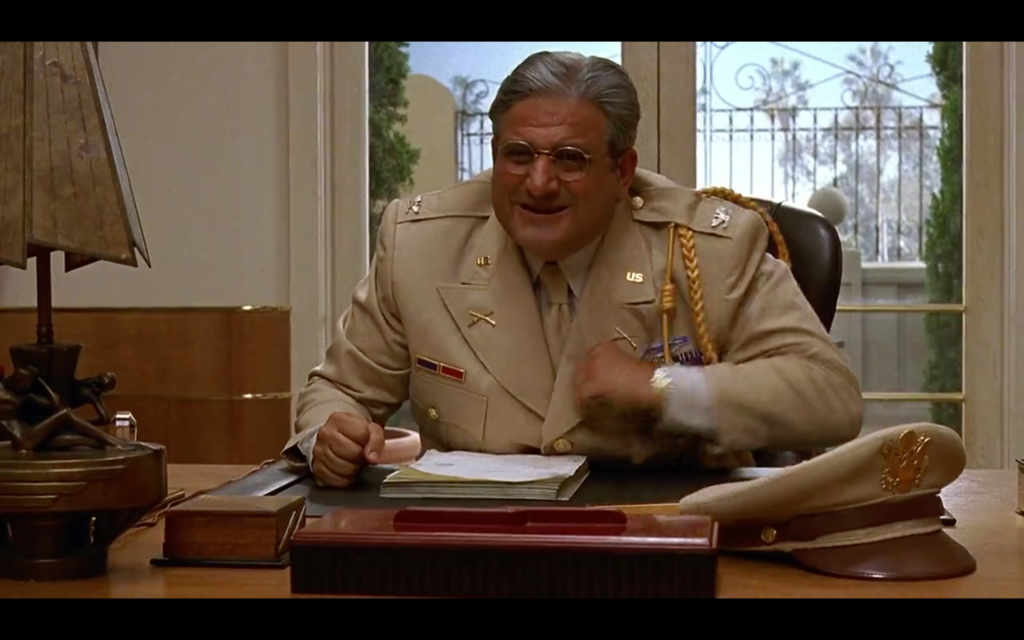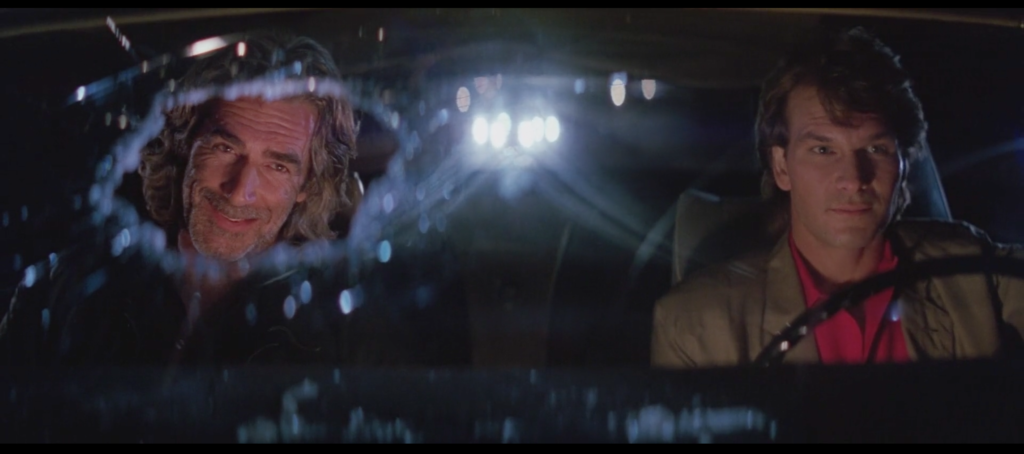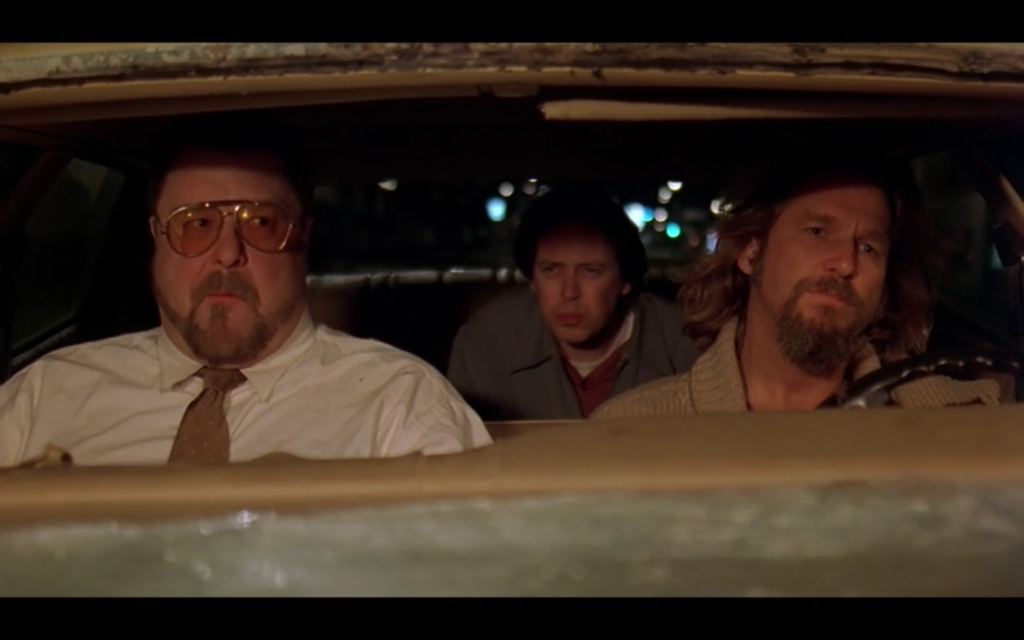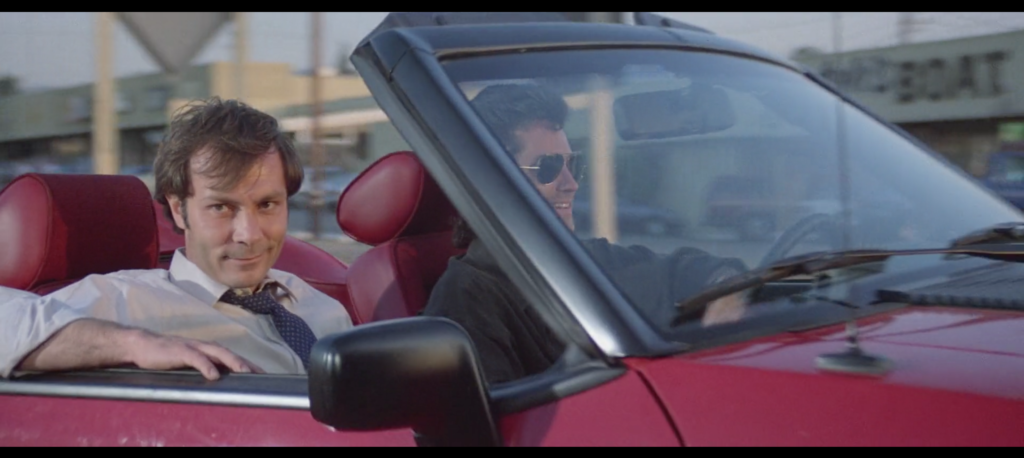Posts Tagged ‘the coen brothers’
The Boiled Leather Audio Hour on Fargo!
February 6, 2024‘Fargo’ Season 5 Ending Explained: What Does Ole Munch The Sin Eater Chowing Down on A Bisquick Biscuit Mean, Anyway?
January 18, 2024In offering the biscuit to Ole, Dorothy is essentially rewriting the very similar sequence from No Country for Old Men, in which the freakish and seemingly unstoppable hitman Anton Chigurrh (Javier Bardem) pays an identically menacing visit to Carlar Jean Moss (Kelly Macdonald), long after his business with her husband Llewelyn (Josh Brolin) seemed to have concluded. Like Dorothy tells Ole, Carla Jean tells Anton that his strange code of honor isn’t some binding thing placed on him from some external authority — it’s a choice he makes, or doesn’t make, to continue hurting people. He could stop if he wanted, stop right then and there.
The Coens’ oeuvre and the Fargo TV show alike are full of characters like this — strange, implacable killers who seem like visitors from another world. (Indeed, they usually are alien to “normal” American culture in some way, in terms of nationality or subculture.) No Country’s Chigurrh, Raising Arizona’s Leonard Smalls, Miller’s Crossing’s the Dane (J.E. Freeman), a character I won’t spoil for you in Barton Fink. On the show, you’ve got Season 1’s Lorne Malvo (Billy Bob Thornton), Season 2’s Hanzee Dent (Zahn McClarnon) and the Kitchen Brothers (Brad and Todd Mann), Season 3’s V.M. Varga (David Thewlis) and his henchmen Yuri (Goran Bogdan) and Meemo (Andy Yu), Season 4’s Constant Calamita (Gaetano Bruno), plus the recurring character of Mr. Wrench (Russell Harvard). Whether they live or die, these men all have one thing in common: Ain’t no one serving them biscuits. No one’s telling them they can refuse to swallow the shit the rich and awful make us eat. No one’s telling them they can be forgiven.
I went long on the end of Fargo Season 5 for Decider. (You can skip the servicey bits if that’s not your thing.)
030. “My only sister’s son”
January 30, 2019“I name Éomer my sister-son to be my heir.”—Théoden, The Lord of the Rings
“He’s my only sister’s son, and if he doesn’t have me, who’s he got?”—Brad Wesley, Road House
Not even I, a person with the White Tree of Gondor tattooed on my arm who is writing an essay about Road House every day for a year, can come up with much of a connection between the King of Rohan and the Chief Job Creator of Jasper, Missouri beyond the antiquated syntax with which they refer to their nephews, Éomer son of Éomund and Pat McGurn respectively. Wesley isn’t about to name his mustachioed kinsman his successor anytime soon, certainly. “Pat’s got a weak constitution, you boys know that,” he tells his assembled henchmen after two of their number, Tinker and O’Connor, failed to forcibly reinstate Pat in his old gig at the Double Deuce during one of the Knife Nerd incidents. “That’s why he’s working as a bartender.” Poor Pat, not even fit for full-time goonmanship.
Pat isn’t even present to hear this condescension, having slunk shamefacedly into Uncle Brad’s mansion at the first opportunity, allowing his comrades-in-goon to take the heat. Why should he bother sticking around? He knows his place, and it’s not at his uncle’s side. It’s Jimmy, Wesley’s strong right hand and, in my considered opinion, secret bastard son who’s the heir apparent. “I should have let you go, Jimmy,” Wesley says regarding the failed mission, an avuncular (fatherly?) hand on the back of the younger man’s neck. Better for Pat to spare himself the sight.
So no, Wesley’s rhetorical style here doesn’t remind me of Théoden King. Rather, I’m put in mind of another great man.
Jack Lipnick is the head of Capitol Pictures, the studio that hires a certain New York playwright to give a Wallace Beery wrestling picture That Barton Fink Feeling. Like Brad Wesley, he came up the hard way (“I mean, I’m from New York myself. Well, Minsk, if you wanna go all the way back—which we won’t, if you don’t mind, and I ain’t asking”) and rose to prominence and power by exerting control over the local economy, largely by screwing other business owners out of their share (regarding his assistant Lou Breeze: “Used to have shares in the company. Ownership interest. Got bought out in the Twenties. Muscled out, according to some. Hell, according to me”).
The tone Lipnick adopts when speaking about producer Ben Geisler, whom he fires instead of Barton when the latter screws up, sounds familiar. “That man had a heart as big as the all outdoors, and you fucked him!” he says, voice soaring as if with the eagles as he describes the generosity of spirit found in a guy he shitcanned, then cracking like a whip as he drops the f-bomb on the person truly at fault, at least in his eyes.
Though he prefers physical assault to firings, Brad Wesley reacts in similar fashion over his sister-son’s plight, arbitrarily beating his goon O’Connor unconscious for, alternately, being untruthful, unable to admit he was wrong, weak, unable to tolerate pain, cowardly and above all prone to bleeding. O’Connor’s failure regarding Pat may have occasioned the beating, but it isn’t even mentioned during the beating itself as one of Wesley’s half-dozen reasons for inflicting it.
For men like Wesley and Lipnick, people are worth caring about only to the extent that doing so, or pretending to do so, enables them to torment others on their nominal behalf. These men, like their words, are overinflated and empty. The overwrought sentiment intended to conceal the lie reveals it instead.
028. Lebowski (I): Windshields
January 28, 2019Road House is a 1989 film in which a grizzled gray-haired man with a molasses drawl played by Sam Elliott dispenses wisdom to a practitioner of tai chi who finds himself at odds with a rich, sleazy business magnate with a personal goon squad played by Ben Gazzara. The Big Lebowski is a 1998 film about same.
We will be revisiting the Road House/Lebowski Cinematic Universe. Boy, will we! But for now let’s focus on what I like to call The Windshield Shots. In Road House, Wade Garrett has just arrived in Jasper, Missouri to lend a hand to his old running buddy Dalton as the latter wages an increasingly vicious war with Brad Wesley, the film’s Gazzara. After rescuing his ass from a four-on-one beatdown—seriously, they’re just holding him in place and punching him in the gut like he’s a human heavy bag when Wade finally shows up to save the day—Wade goes for a drive in the passenger seat of Dalton’s car, the abuse of which by the angry patrons of the Double Deuce is a running gag, one that runs too far by any reasonable standard in fact. For that reason, riding shotgun puts Wade in an unenviable position.
But look at Wade here. He’s tickled pink! I assume he likes the feel of the wind through his magnificent head of hair, but it’s more than that. We will see, time and time again, how his most dangerous and dirty exploits amuse him, and how the same is true of Dalton’s. Riding through Jasper with a gigantic hole of shattered glass in front of him reassures him that it’s business as usual for his treasured “mijo.” It’s a sign that Dalton’s pissing off all the right people. And since Wade is a firm believer in the cut-and-run strategy when shit gets too heavy, he’s no doubt aware that the car will not long outlive Dalton’s stay in town, however long that may be. “It seems to me you’d be a little more more…philosophical about it,” he says later (much later) that evening, about an entirely different matter. But that hole in the glass, framing his “Aw shit-hell kid, I’m in hog heaven” grin, is already our lens into the Wade Garrett Mindset. He looks at broken things and sees a chance to live a life defined more by parts than the whole they add up to. Moving from one sensation to the next, treating calamity as opportunity, riding the nightlanes, bound only to those who ride with him: That is Wade Garrett. All Dalton can do is grin and bear it. Currently, it is time to be nice.
The Lebowski triarchy is an entirely different matter. Put aside whatever this Windshield Shot does or doesn’t owe to its predecessor. (I certainly believe the Coen Brothers, who after all put Sam Elliott and Ben Gazzara in their movie about a pair of weirdos fending off some rich guys and some goons, had seen Road House, but it’s irrelevant.) Despite sharing the tonsorial sensibilities of Wade Garrett, the Dude, played by Jeff Bridges, is pointedly not enjoying this breezy night drive. There will be no next down for him to head to. His car is not something he can stand to sacrifice. The Dude does not abscond. The Dude abides. He’d prefer to abide with a windshield.
Walter Sobchak occupies the Wade position in the car, but again, the contrast is revealing. No smile for Walter, no “shyush, don’t this beat all” grin. Walter is a man who can never admit that things have not gone according to plan, that every eventuality has not been foreseen and warded against. If at the beginning of the evening he said they would swing by the In-N-Out Burger, then goddammit that’s what they’re doing. If, in the interim, they attempt to brace a teenage boy for money he didn’t steal, vandalize a car he didn’t buy, and antagonize the neighbor who is the real owner of the car until the Dude’s own vehicle winds up getting the worse of it…well, the In-N-Out’s still there, isn’t it? Then he’ll by god buy it and eat it. As he says elsewhere in the film, “I’m staying. I’m finishing my coffee. Enjoying my coffee.” Situation normal, et cetera et cetera. Ironically, only his fellow veteran of American imperialist adventure in East Asia, Brad Wesley, shares this need to control the narrative.
Oh, Donny? Donny’s literally taking a back seat, literally a few steps behind. (Windshield’s out, Dude.) Lacking any physical or intellectual agency, he’s just along for the ride. He has no character in Road House. Unless…unless…
“Fargo” thoughts, Season Three, Episode Three: “The Law of Non-Contradiction”
May 8, 2017Hawley tapped John Cameron, a longtime collaborator of both the Coens and their old friend Sam Raimi, to helm one of the series most Coen-esque installments ever, which is really saying something. (Un)comfortably ensconced in Los Angeles rather than the upper midwest, Fargo could really bring its Barton Fink/Big Lewbowski A-game, with some of its most explicit shout-outs and hat-tips yet. For example, the “ring for service” bell that never seems to stop ringing, the shot of Gloria reclining on the beach looking out into the sea, the mysterious shoes and the equally mysterious box, the screening room lit by the hazy light of the projector, Tad’s role as a screenwriter whose success in another medium leads him to get in over his head in Hollywood: That’s that Barton Fink feeling, baby, brought to you by filmmakers who understand the feelings of alienation and insecurity they’re supposed to engender in you, not just by people who are trying to coast on the residual goodwill of previous work with throwaway references.
In some places the allusions seem to fold endlessly into one another — Gloria’s motel simultaneously evokes Barton Fink’s hotel, the motel that figures prominently in No Country for Old Men, and the site of the Sioux Falls Massacre from the show’s previous season — to say nothing of cinema’s ur-motel, run by one Norman Bates and his mother. The emotional resonance here is dense, is what I’m saying; unlike some shows I could mention — fuck it, I mean Stranger Things — it’s designed to last beyond the mere fact of recognition. In other words, to paraphrase Barton Fink, it will show you the life of the mind.
Despite not caring fro two prominent aspects of last week’s Fargo, I liked the overall thing quite a bit, and explained why at Decider. (That cameo from you-know-who!)
“Fargo” thoughts, Season Two, Episode One: “Waiting for Dutch”
October 13, 2015How did they ever make a TV show of Fargo? The answer: Quite well indeed, surprisingly. At first, second, and even third glance, novelist Noah Hawley’s attempt to translate Joel & Ethan Coen’s Oscar-nominated Minnesota murder-comedy into an anthology series seemed like a frozen folly to rival Seward’s, no matter what the smash Season One success of Nic Pizzolatto’s True Detective augured for another author-helmed cable crime series with a fresh cast and story ever season. Even if Fargowasn’t a straightforward adaptation/expansion of the original, the unique Coen Brothers blend of small-town dorkiness, splatstick comedy, and unsparing despair could perhaps be imitated, but never duplicated, no?
Oh, yeah. Hawley wisely took the Rumsfeldian approach to the seemingly impossible task, solving the problem by making it bigger. Yes, his all-new story borrowed all the familiar elements from the original: the snowy setting, the North Central accents, the pregnant policewoman, the milquetoast murderer, the Mutt-and-Jeff hitmen, the escalating calamities, even little details like an awkward reunion over dinner, a chase over thin ice, and (in the show’s one true link to the movie) a hidden suitcase of loot marked with an ice scraper. But it also made a magpie-like raid on the Coens’ entire oeuvre: a hotel corridor from Barton Fink here, a parable-dispensing rabbi from A Serious Man there, and, in the form of Billy Bob Thornton’s hellaciously awful contract killer Lorne Malvo, a living embodiment of predatory evil out of No Country for Old Men everywhere. (Even composer Jeff Russo’s extraordinary score paid homage to a variety of Carter Burwell’s Coen-movie musical contributions.) The result was less a riff on the Brothers’ 1996 classic and more “Songs in the Key of Coen”—a tribute to the writer-directors’ unflagging ability to playfully puncture the thin ice of human decency and find the deadly cold beneath that may well have surpassed the original.*
All of which makes the show’s Emmy Award–winning first season (technically miniseries, but only the network and the Academy care) a tough act to follow. Not only does the show have to maintain that level of care and quality, it must do so with no Billy Bob, no Bilbo Baggins, and no out-of-nowhere star turn from Allison Tolman as an underappreciated master investigator with a bun in the oven. The sad fate that can befall an anthology series’ sophomore season is as plain as the mustache on Ray Velcoro’s face.
Fortunately, “Waiting for Dutch,” Fargo’s Season Two premiere, is no Redux Detective.
I reviewed the season premiere of Fargo, and talked a lot about its excellent first season too, for the New York Observer, where I’ll be covering the show this season.
Movie Time: Inside Llewyn Davis
December 28, 2013Or Introducing Bruno Delbonnel, stepping in for MIA cinematographer/genius Roger Deakins and (re)creating the grey winter awfulness of New York City so convincingly it felt less like a lighting scheme and more like a ceiling you might bump your head on. Inside Llewyn Davis, for all its subwaying and roadtripping and general peripateticism, is a claustrophobic film, a film about how having no commitments can root you to the spot just as surely as a square life. It can be seen as the third film in the Coen Brothers’ Trilogy of Calamity, with Barton Fink and A Serious Man, but here the calamity is ongoing, not a new thing that starts with a move to Hollywood or the sudden caprice of Hashem. (I suppose you could even squeeze No Country for Old Men in there too if you want, but again, no stumbling across drug money.) Llewyn Davis has been in a folk-scene funk for some time, a depression he shows no signs of exiting. Indeed, a clever bit of editing that could be taken as showing us a pivotal sequence out of order is ever so slightly recut so that we could simply be witnessing subtle variations on the same unending cycle — Sisyphus, Groundhog Day, the Möbius. Certainly the presence of a key figure at film’s end indicates Llewyn’s career will only go so far. The funny thing, the different thing, is that he’d more or less resigned himself to it by that point anyway. He’s not a delusional man, nor does he react to his plight with especially outstanding rage. He’s difficult but not impossible, cruel at times but only when driven to exhaustion by the failure of kindness to produce amicable results. He’s neither a delusional hack nor a tortured genius — he’s a talented guy who knows the limits of his talent but hopes to catch a lucky break. None is forthcoming. Joel and Ethan Coen have made much blacker movies than this one; Inside Llewyn Davis is the Coen Brothers at their greyest.

